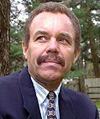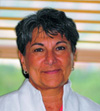 All IRA individual members are encouraged to vote in the 2014 IRA Board Election. Below is information about each candidate. Members are encouraged to review the information on each candidate carefully, discuss the merits of the candidates with other members, and then make the decision and vote.
All IRA individual members are encouraged to vote in the 2014 IRA Board Election. Below is information about each candidate. Members are encouraged to review the information on each candidate carefully, discuss the merits of the candidates with other members, and then make the decision and vote.
The 2014 election opens on December 16, 2013. The deadline to vote is 5:00 p.m. (Eastern Savings Time) on February 10, 2014. New Board members begin their terms at the IRA Annual Conference in May 2014.
Online Voting Makes It Easy
The 2014 election is being conducted primarily online. This means that active individual IRA members with valid e-mail addresses will receive an e-mail message with a link to their online ballot and will vote online.
IRA members who do not have valid e-mail addresses will receive a paper ballot by regular mail and can choose to return the paper ballot or to vote online. Beginning in mid-December these members can vote online by visiting /, clicking the “2014 IRA Board Election Ballot” link, and then entering the ballot control number found on their paper ballot.
Any questions about online voting can be discussed with Intelliscan, Inc. staff at +1-610-935-6173 or iravoting@intelliscaninc.net. Members can contact IRA customer service staff at 1-800-336-7323 (option “1”) or customerservice@/ with any questions related to their IRA membership.
Ballot Count Procedures
The 2014 election will be handled by the independent firm of Intelliscan, Inc., whose staff members oversee the distribution of electronic ballots and the mailing of paper ballots, receive the returned ballots, supervise and observe the opening of returned ballots, count the ballots electronically, and certify the results.
When paper ballots are incompletely marked, but there is a clear indication of the intended vote, the appropriate vote will be counted. Ballots with fewer than the maximum number of votes are valid, as the computer will count each vote. Ballots on which more than the permissible number of votes has been marked are rejected by the computer and not recorded in the count. Mutilated ballots are separated out to be repaired or remarked; ballots with write-in votes are also kept for a hand tally of the written names.
Campaigning Policy
As a professional organization we disallow campaigning for office by the candidates, by other individuals, or by councils or affiliates. All candidates for this election have agreed to this policy. If you received campaign materials or solicitations, please keep this in mind as you vote.
Candidates for IRA Vice-President
 Diane Barone, Professor, College of Education, University of Nevada, Reno, Nevada
Diane Barone, Professor, College of Education, University of Nevada, Reno, Nevada
Education: Ed.D., University of Nevada; M.Ed., Kent State University; B.A., Case Western Reserve University
Contributions to IRA: IRA Board of Directors (2005–2008); Editor The Reading Teacher (2010–present); Editor Reading Research Quarterly (1994–2002); Local Chair, IRA convention (2004); Cochair, Children’s and Young Adults’ Book Award (2013); Chair, Outstanding Dissertation Committee (2008–2010); President, Literacy Development of Young Children (1998–2001); Chair, Committee on Grants and Awards (2002–2003); Publications Committee (1994–2002; 2007–2008); Urban Initiative Committee (2005–2008); Technology Committee (2005–2008); Liaison to Asian Affiliates (2005–2008).
Contributions to the Profession: Books: Best Practices in Early Literacy; Children’s Literature in the Classroom; Literacy Instruction for English Language Learners; Writing Without Boundaries; Practical Guide to Classroom Literacy Assessment; Narrowing the Literacy Gap; and others. Articles: “Exploring Home and School Involvement of Young Children With Web 2.0 and Social Media,” Research in the Schools; “Making Meaning: Individual and Group Response Within a Book Club Structure,” The Journal of Early Childhood Literacy;“Welcoming Families: A Parent Literacy Project in a Linguistically Rich, High-Poverty School,” Early Childhood Education Journal;and others. Awards: UNR Outstanding Researcher Award, 2013; UNR Distinguished Outreach Faculty Award, 2011; John Chorlton Manning Award, IRA, 2010; Albert Kingston Award, NRC, 2009.
Statement of Philosophy: Teachers are the center of IRA as they are charged with improving literacy throughout the world even in stressful and underappreciated times. They know issues remain in bringing opportunities for literacy learning to all students, especially those of diverse socioeconomic, cultural, and linguistic backgrounds, but they do not lose heart in pursuing this goal. Immersed in these understandings, I believe IRA must work closely with teachers to support them with the challenges of current expectations in literacy that include multimodal literacies, Common Core Standards, and increased demands for literacy performance for all students. I believe my personal experiences reify my belief in the importance of teachers; for instance, as the recipient of the John Chorlton Manning award that honored my work with teachers; as Editor of Reading Research Quarterly and The Reading Teacher where the focus shifted so each article now supports the work of teachers, especially in the current CCS environment; and as local chair for the 2004 IRA convention where I collaborated with the local school district so all teachers were released to attend the conference. I believe teachers around the world dream of a world in which everyone, child, and adult alike, can read and write to participate in a global society as citizen, worker, family, and fulfilled individual. Success in teaching the world to read is critical today, more than ever—working together we can accomplish this vision.
 Brenda Overturf, Educational Consultant, Louisville, Kentucky
Brenda Overturf, Educational Consultant, Louisville, Kentucky
Education: Ed.D., University of Louisville, Kentucky, 1999; M.Ed., Eastern Kentucky University, Richmond, Kentucky, 1982; B.S., Georgetown College, Georgetown, Kentucky, 1976
Contributions to IRA: IRA Board of Directors (2009–2012); Common Core Standards Committee Cochair (2012–2014); Co-author Literacy Implementation Guidance for the ELA Standards; Councils Task Force Chair; Diversity Award Committee; Teacher Advisory Panel Chair; Liaison to Europe; Governmental Relations Committee;Kentucky Reading Association Past-President; Conference Chair; Governmental Relations Committee Chair; Advocacy Award winner; Greater Louisville Reading Council Past-President; IRA Publications: The Common Core: Teaching K–5 Students to Meet the Reading Standards; The Common Core: Teaching Students in Grades 6–12 to Meet the Reading Standards; Graphic Organizers for Teaching K–12 Students to Meet the Reading Standards. Frequent presenter IRA Conference, World Congress, and state reading conferences.
Contributions to the Profession: K–12: Classroom teacher (18 years); District Reading Curriculum and Assessment Administrator for Jefferson County Public Schools, Louisville, KY (6 years); University: Teacher Educator/Chair M.Ed. in Reading at the University of Louisville (6 years); Adjunct at other local higher education institutions; Finalist NRC Graduate Student Award; State: Site director Kentucky Reading Project (K–5) and Adolescent Literacy Coaching Project; Coauthor KY Adolescent Literacy Plan; Partner, KY Striving Readers grant; Governor’s Literacy Summit; KY Literacy Preparation Advisory Committee; Author: Word Nerds: Teaching All Students to Learn and Love Vocabulary (Stenhouse); Inside the Common Core Classroom: Practical Strategies for ELA, Grades 3–5 (in press).
Statement of Philosophy: IRA is comprised of talented and dedicated literacy professionals who have much to share across states, provinces, and nations. Creating more robust networks of literacy professionals connected world-wide would help us better learn about reading, writing, and thinking. Similarly, strong councils and affiliates make an effective Association. Now, more than ever, we need to work together to keep IRA’s place as the premier literacy organization in the world. This will take innovative ideas, developing a sense of belonging for all professionals, and fiscal responsibility. Together, we can achieve IRA goals in professional development, advocacy, partnerships, research, and global literacy development.
Candidates for IRA Board of Directors
 Donald Bear, Professor, Iowa State University, Ames, Iowa
Donald Bear, Professor, Iowa State University, Ames, Iowa
Education: Ph.D., University of Virginia, 1982; M.Ed., University of Virginia, 1977; B.A., George Washington University, 1974
Contributions to IRA: National, State, Council and SIG Keynote, Featured, Preconvention, Research Presentation Organizer and Presenter for 30 years; President, Silver State Reading Association; President, Sierra Nevada Council President; Regional IRA Conference Co-Coordinator; RWCT IRA Program Volunteer (Romania, 1998); Member, Dissertation of the Year Award Committee; Editor of newsletter for the Language Experience SIG (1992-1993), and LEA SIG Board Member, (1991-1994); Author of three chapters in IRA books, and articles in IRA publications (EL and Literacy book, SIG journal, The Reading Teacher, Journal of Reading); reviewer Reading Research Quarterly; Awarded Celebrate Literacy Award 1991, 1988, Marcus Foster Memorial Reading Award, California Reading Association, 2011.
Contributions to the Profession: Donald is involved in numerous studies that examine literacy learning, including studies of orthographic development in English and other languages and for students learning English as a new language. He is an author and coauthor of dozens of articles and book chapters, and 16 books, including Words Their Way, 5th ed.; Words Their Way With English Learners, 2nd ed.; Vocabulary Their Way; and Words Their Way With Struggling Readers, 4–12. He is an author of several instructional programs.
Statement of Philosophy: Classroom teachers are the key to excellent literacy instruction, and IRA, as the premier literacy organization, is uniquely situated to develop bonds among reading educators, teachers, and our allied educators in special education and content disciplines. Through member participation, IRA can lead the way toward infusing standards both as students learn foundational skills, and as they strive to think deeply and apply their learning in meaningful ways. IRA can foster an ethic that embraces new literacies in teaching students to read, write, and think, and envision literacy instruction for multilingual and diverse student populations. IRA can continue to grow in its online presence and support local and online communities of educators.
 Julie Coiro, Associate Professor, University of Rhode Island, Kingston, Rhode Island
Julie Coiro, Associate Professor, University of Rhode Island, Kingston, Rhode Island
Education: Ph.D., University of Connecticut; M.Ed., University of New Orleans; B.S., University of Connecticut
Contributions to IRA: President, Technology in Literacy Education Special Interest Group; Chair, Technology, Communication and Literacy Committee (2009–2012); Co-wrote IRA’s Position Statement on New Literacies and 21st-Century Technologies (2009); Moderator, RTEACHER Listserv; Member, IRA Program Committee; Editorial Review Board for The Reading Teacher and Reading Research Quarterly; Advisory Council, Reading Today; Reviewer: IRA Research Awards, conference proposals, and Presidential Award for Reading & Technology.
Contributions to the Profession: Julie taught in preschool, elementary, and middle school settings; now she is a professor, researcher, and staff developer of offline and online reading comprehension strategy instruction, new literacies of the Internet, and effective practices for technology integration and professional development. Publications: 26 articles/chapters, 2 books (Teaching With the Internet K–12; Handbook of Research on New Literacies); Affiliations: IRA, AERA, LRA, and ASCD; Researcher for federally funded Teaching Internet Comprehension to Adolescents (TICA) Project and Co-PI of Online Research and Comprehension Assessment (ORCA) Project.
Statement of Philosophy: When thinking about how IRA can maintain its leadership in advancing the quality of literacy instruction and research, three ideas come to mind: innovation, open communication, and professional support. First, I believe IRA can expand its use of innovative digital spaces and social networking opportunities that connect members’ efforts to transform literacy experiences across the globe. Second, IRA can continue to be transparent about decisions and goals in ways that build strong partnerships. Open communication helps build collaboration among current members and attracts new members seeking to actively play a role in the literacy community. Finally, being diligent in addressing members’ changing literacy needs and concerns will ensure members have the professional support they deserve in our increasingly connected and rapidly changing world.
 Eric Cooper, President and Founder, National Urban Alliance, Syosset, New York
Eric Cooper, President and Founder, National Urban Alliance, Syosset, New York
Education: Ed.D., Columbia University’s Teachers College; M.A., Columbia University’s Teachers College; Ed.M., Columbia University’s Teachers College; B.A., City University, New York City
Contributions to IRA: Member of the Urban Diversity Initiatives Commission (2000–2007); Diversity Steering Committee (2007–2008); Urban Diversity Committee (2010–2011, 2013–2014), and Title I/Literacy Learning of High Poverty Students Task Force (2011–2012). He is Cofounder of the Urban Partnership for Literacy with the International Reading Association. Eric has been a Keynote Speaker at the IRA State Conferences in Colorado, Connecticut, and New York.
Contributions to the Profession: Publications include: From “Just a Teacher” to Justice in Teaching—Working in the Service of Education, the New Civil Right; Teaching All the Children: Strategies for Developing Literacy in an Urban Setting; Reading, Thinking & Concept Development; Educating Black Children: America’s Challenge; It Begins With Belief: Social Demography Is Not Destiny; The Importance of Professional Development to Unlock the Potential of Students in Urban Settings; Toward a New Mainstream of Instruction of American Schools; Reading, Thinking and School Effectiveness; An Effective School Network With a Legislative Emphasis; Managing the Change Process for Teaching Thinking; Addressing Urban School Reform: Issues and Alliances; School Improvement Through Instructional Design; The Change Process and Its Implications in Teaching Thinking;and Realities and Responsibilities in the Education Village. Eric has received the 2008 Dr. Martin Luther King, Jr. award from the Israeli Consulate of New York City, the Jewish National Fund and the Jewish Federation of Stamford, New Canaan, and Darien.
Statement of Philosophy: My educational mission is to support the improvement of education for urban and minority students. I view education not just as a civil right but as a human justice right and I maintain an irrefutable belief in the capacity of all school children and youth to succeed at the highest academic levels.
 Lori DiGisi, School Administrator, Framingham Public Schools, Framingham, Massachusetts
Lori DiGisi, School Administrator, Framingham Public Schools, Framingham, Massachusetts
Education: Ed.D., Harvard University, 1993; M.Ed., George Washington University, 1985; B.A., Lehigh University, 1983
Contributions to IRA: Common Core State Standards Committee (2011–Present); Contributed to Literacy Implementation Guidance for the ELA Common Core State Standards white paper; President, Secondary Reading Interest Group (2010–2012); President Elect, SRIG (2008–2010); Led discussion of CCSS with State Council Leaders at IRA Convention (2011); President, Massachusetts Reading Association (2011–2012); MRA Board Member (2007–2013); Legislative team convinced Barney Frank to sign onto Striving Readers Legislation with IRA Legislative Action Team (2009); Distinguished Finalist for the Outstanding Dissertation Award (1994).
Contributions to the Profession: Lori works to create connections across disciplines and from researchers to practitioners. Articles: DiGisi, L.L., (2010). “Response to reviewing adolescent literacy reports: Key components and critical questions.” Journal of Literacy Research. 42 (2), 115–123. DiGisi, L.L. and Fleming, D. (September, 2005) Literacy specialists in math class! Voices from the Middle. 13 (1). 48–52. Dickinson, D.K. & DiGisi, L.L. (March 1998). The many rewards of a literacy-rich classroom. Educational Leadership, pp. 23–26.
Statement of Philosophy: Educators who teach students how to read, and who provide opportunities for students to read the texts that encourage them to keep reading and writing, develop educated, empathetic citizens able to lead our global society. Knowledgeable teachers make effective instructional decisions for students. It is the duty of professional organizations to support research and to provide the forum for professionals to discuss, debate, and share practices that ensure students learn.
 Janice A. Dole, Professor, University of Utah, Salt Lake City, Utah
Janice A. Dole, Professor, University of Utah, Salt Lake City, Utah
Education: Ph.D., University of Colorado; M.A., University of Colorado; B.A., University of Massachusetts at Boston
Contributions to IRA: State Council Positions: Utah Council of IRA, President (2013–2014); President-Elect (2012–2013); Vice-President (2011–2012). Committees: North American Council of the IRA (2013–2014); Early Literacy Interest Group (2003–2008); Studies and Research: Grants Subcommittee (1995–1997); Applied Literacy Project (1995–1997); IRA/NCTE Advisory Board Member, Standards Project for English Language Arts (1994–1995). International Volunteer: Reading/Writing for Critical Thinking Project:Hungary (2000); Estonia (1998, 1997); Lithuania (1999, 1998, 1997). Presentations: Tartu, Estonia (1998); Stockholm (1990); London (1986); Hong Kong (1984). San Antonio (2013); Chicago (2012); Phoenix, Minneapolis (2009); Atlanta (2008); Toronto (2007, 2005, 2002); Kona, Hawaii (2006); Chicago (2006); New Orleans (1996). Editorial Work: Editorial Column, The Reading Teacher (2005–2007). Editorial Review Board, Reading Research Quarterly (1995–2007; 2012–current).
Contributions to the Profession: Classroom Teacher—primary grades and middle school, Massachusetts, California, Colorado (1969–1974). Over 90 articles, chapters, books, reports, and reviews in journals such as Reading Research Quarterly, Journal of Educational Psychology, The Elementary School Journal,and The Reading Teacher. Over 50 national refereed presentations at conferences such as the American Educational Research Association and the National Literacy Conference. Member Anchoring Panel, Instrument Development Panel, Expert Reading Consultant, National Assessment of Educational Progress (1992–2013). Appointed Panel Member, National Academy of Sciences, Committee on the Study of Teacher Preparation Programs (2005–2010). Appointed Panel Member, RAND Reading Study Group, Office of Educational Research and Improvement (2000–2002). Reading Coordinator, Utah State Office of Education (1995–2000).
Statement of Philosophy: An important IRA strategic goal is to provide access to high-quality professional development grounded in evidence-based practices and instruction. In the years to come, IRA will need to continue responding to rapid changes in professional development needs through the use of innovative ideas and technologies. Such changes will help IRA grow into a global organization to support literacy worldwide.
 Glenda Nugent, Independent Literacy Consultant, Saint Peters, Missouri
Glenda Nugent, Independent Literacy Consultant, Saint Peters, Missouri
Education: M.Ed., University of Arkansas, Fayetteville; B.S., University of Arkansas, Monticello
Contributions to IRA: Arkansas Reading Association President, Conference Chair, and Legislative Chair; Missouri State Council Board Member; North American Representative for the International Development Coordinating Committee; Member of the Paul Witty Short Story Award Committee; Member of the Council and Affiliate Task Force; President of the LEADER-SIG; and IRA Volunteer to Pakistan. Awards: IRA MaryAnn Manning Award and the Sarah Nelson Womble Award from the Arkansas Reading Association.
Contributions to Profession: Classroom Teacher, Intervention Teacher, and Literacy Specialist in Arkansas, California, and Missouri; Manager for Reading, Arkansas Department of Education; Director of Literacy and Early Childhood, Little Rock School District; and adjunct professor, University of Arkansas, Little Rock. Currently, she is an Independent Literacy Consultant. Her recent publications include A Practical Guide to Action Research for Literacy Educators, published online by IRA, and contributions to the LEADER newsletter and also Arkansas and Missouri IRA newsletters.
Statement of Philosophy: IRA must continue to be a worldwide leader in literacy education by promoting excellence in literacy instruction nationally and internationally. For literacy and information and leadership support to reach educators, and impact students, it is critical to maintain and grow current membership by providing focused and effective support to local, state, and affiliate councils. Creating partnerships with local, national, and international organizations will further expand the reach of the excellent opportunities from IRA.
More Information
Read more details or vote on the IRA election information webpage.